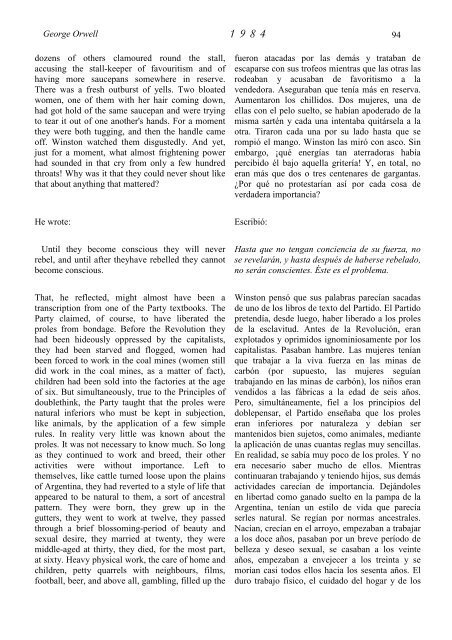You also want an ePaper? Increase the reach of your titles
YUMPU automatically turns print PDFs into web optimized ePapers that Google loves.
George Orwell 1 9 8 4<br />
dozens of others clamoured round the stall,<br />
accusing the stall-keeper of favouritism and of<br />
having more saucepans somewhere in reserve.<br />
There was a fresh outburst of yells. Two bloated<br />
women, one of them with her hair coming down,<br />
had got hold of the same saucepan and were trying<br />
to tear it out of one another's hands. For a moment<br />
they were both tugging, and then the handle came<br />
off. Winston watched them disgustedly. And yet,<br />
just for a moment, what almost frightening power<br />
had sounded in that cry from only a few hundred<br />
throats! Why was it that they could never shout like<br />
that about anything that mattered?<br />
He wrote: Escribió:<br />
Until they become conscious they will never<br />
rebel, and until after theyhave rebelled they cannot<br />
become conscious.<br />
That, he reflected, might almost have been a<br />
transcription from one of the Party textbooks. The<br />
Party claimed, of course, to have liberated the<br />
proles from bondage. Before the Revolution they<br />
had been hideously oppressed by the capitalists,<br />
they had been starved and flogged, women had<br />
been forced to work in the coal mines (women still<br />
did work in the coal mines, as a matter of fact),<br />
children had been sold into the factories at the age<br />
of six. But simultaneously, true to the Principles of<br />
doublethink, the Party taught that the proles were<br />
natural inferiors who must be kept in subjection,<br />
like animals, by the application of a few simple<br />
rules. In reality very little was known about the<br />
proles. It was not necessary to know much. So long<br />
as they continued to work and breed, their other<br />
activities were without importance. Left to<br />
themselves, like cattle turned loose upon the plains<br />
of Argentina, they had reverted to a style of life that<br />
appeared to be natural to them, a sort of ancestral<br />
pattern. They were born, they grew up in the<br />
gutters, they went to work at twelve, they passed<br />
through a brief blossoming-period of beauty and<br />
sexual desire, they married at twenty, they were<br />
middle-aged at thirty, they died, for the most part,<br />
at sixty. Heavy physical work, the care of home and<br />
children, petty quarrels with neighbours, films,<br />
football, beer, and above all, gambling, filled up the<br />
fueron atacadas por las demás y trataban de<br />
escaparse con sus trofeos mientras que las otras las<br />
rodeaban y acusaban de favoritismo a la<br />
vendedora. Aseguraban que tenía más en reserva.<br />
Aumentaron los chillidos. Dos mujeres, una de<br />
ellas con el pelo suelto, se habían apoderado de la<br />
misma sartén y cada una intentaba quitársela a la<br />
otra. Tiraron cada una por su lado hasta que se<br />
rompió el mango. Winston las miró con asco. Sin<br />
embargo, ¡qué energías tan aterradoras había<br />
percibido él bajo aquella gritería! Y, en total, no<br />
eran más que dos o tres centenares de gargantas.<br />
¿Por qué no protestarían así por cada cosa de<br />
verdadera importancia?<br />
Hasta que no tengan conciencia de su fuerza, no<br />
se revelarán, y hasta después de haberse rebelado,<br />
no serán conscientes. Éste es el problema.<br />
Winston pensó que sus palabras parecían sacadas<br />
de uno de los libros de texto del Partido. El Partido<br />
pretendía, desde luego, haber liberado a los proles<br />
de la esclavitud. Antes de la Revolución, eran<br />
explotados y oprimidos ignominiosamente por los<br />
capitalistas. Pasaban hambre. Las mujeres tenían<br />
que trabajar a la viva fuerza en las minas de<br />
carbón (por supuesto, las mujeres seguían<br />
trabajando en las minas de carbón), los niños eran<br />
vendidos a las fábricas a la edad de seis años.<br />
Pero, simultáneamente, fiel a los principios del<br />
doblepensar, el Partido enseñaba que los proles<br />
eran inferiores por naturaleza y debían ser<br />
mantenidos bien sujetos, como animales, mediante<br />
la aplicación de unas cuantas reglas muy sencillas.<br />
En realidad, se sabía muy poco de los proles. Y no<br />
era necesario saber mucho de ellos. Mientras<br />
continuaran trabajando y teniendo hijos, sus demás<br />
actividades carecían de importancia. Dejándoles<br />
en libertad como ganado suelto en la pampa de la<br />
Argentina, tenían un estilo de vida que parecía<br />
serles natural. Se regían por normas ancestrales.<br />
Nacían, crecían en el arroyo, empezaban a trabajar<br />
a los doce años, pasaban por un breve período de<br />
belleza y deseo sexual, se casaban a los veinte<br />
años, empezaban a envejecer a los treinta y se<br />
morían casi todos ellos hacia los sesenta años. El<br />
duro trabajo físico, el cuidado del hogar y de los<br />
94


